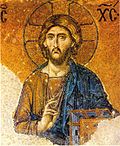- Melito of Sardis
-
Melito of Sardis Apologist and Bishop of Sardis Died 180 Honored in Roman Catholic Church, Eastern Orthodox Church, Eastern Catholic Church Canonized Pre-congregation Feast 1 April Melito of Sardis (died c. 180 C.E.) was the bishop of Sardis near Smyrna in western Anatolia, and a great authority in Early Christianity: Jerome, speaking of the Old Testament canon established by Melito, quotes Tertullian to the effect that he was esteemed a prophet by many of the faithful. His feast is celebrated on April 1.
Contents
Peri Pascha
Part of a series on Eastern Christianity 
History Orthodox Church History
Specific regions:
Byzantine Empire
Ecumenical council
Christianization of Bulgaria
Christianization of Kievan Rus'
East-West Schism
Asian Christianity
Coptic Egypt · UkraineTraditions Orthodox Church
Others:
Oriental Orthodoxy
Ethiopian Tewahedo Church
Coptic Church
Church of the East
Eastern Catholic Churches
Syriac ChristianityLiturgy and worship Sign of the cross
Divine Liturgy
Iconography
Asceticism
OmophorionTheology Hesychasm · Icon
Apophaticism
Filioque clause
Miaphysitism
Monophysitism
Diophysitism
Nestorianism
Theosis · Theoria
Phronema · Philokalia
Praxis · Theotokos
Hypostasis · Ousia
Essence vs. Energies
MetousiosisMelito was a prolific early Christian writer, judging from lists of his works preserved by Eusebius and Jerome. Aside from a homily Peri Pascha (On the Passover) in the Bodmer Papyri, only fragments of his works survive.
Apology
About 161 Melitus wrote a celebrated apology for Christianity which he sent to Marcus Aurelius[1], begging him "not overlook us in the midst of such lawless plundering by the mob."
Date of Easter
Melito was a Quartodeciman (Fourteenther)[2], observing Easter on the Jewish Passover date of 14 Nisan, as did Polycrates of Ephesus et al., writing On the Passover[3] and other works, which were destroyed after Easter observance was fixed on Sunday and they were declared heretics.
Old Testament Canon
Main article: Melito's canonAround 170 after traveling to Palestine, and probably visiting the library at Caesarea Maritima, Melito compiled the earliest known Christian canon of the Old Testament, a term he coined. A passage cited by Eusebius contains Melito's famous canon of the Old Testament. Melito presented elaborate parallels between the Old Testament or Old Covenant, which he likened to the form or mold, and the New Testament or New Covenant, which he likened to the truth that broke the mold, in a series of Eklogai, six books of extracts from the Law and the Prophets presaging Christ and the Christian faith.
Millennialism
According to the Catholic Encyclopedia, Melito was a Chiliast, and believed in a Millennial reign of Christ on Earth, and followed Irenaeus in his views. Jerome [Comm. on Ezek. 36 ] and Gennadius [De Dogm. Eccl., Ch. 52] both affirm that he was a decided millennarian.
Idolatry
Melito wrote against idolatry, or relying on teachings of Church fathers to condone it (Melito's Apology addressed to Marcus Aurelius Antoninus).
Attributes of God
Origen, in a brief note, relates that Melito ascribed corporeality to God, and believed that the likeness of God is preserved in the human body. The note is too brief to tell exactly what Melito might have meant by this.
Death and legacy
A letter of Polycrates of Ephesus to Pope Victor I written in about 194, mentioned by Eusebius, (H.E. 5.24) states that "Melito the eunuch" was interred at Sardis.
Melito's reputation as a writer remained strong into the Middle Ages: numerous works were pseudepigraphically ascribed to him.
Notes
References
- Hansen, Adolf, and Melito. 1990. The "Sitz im Leben" of the paschal homily of Melito of Sardis with special reference to the paschal festival in early Christianity. Thesis (Ph. D.)--Northwestern University, 1968.
- Melito, and Bernhard Lohse. 1958. Die Passa-Homilie des Bischofs Meliton von Sardes. Textus minores, 24. Leiden: E.J. Brill.[4]
- Melito, J. B. Pitra, and Pier Giorgio Di Domenico. 2001. Clavis Scripturae. Visibile parlare, 4. Città del Vaticano: Libreria editrice vaticana. [5]
- Melito, J. B. Pitra, and Jean Pierre Laurant. 1988. Symbolisme et Ecriture: le cardinal Pitra et la "Clef" de Méliton de Sardes. Paris: Editions du Cerf. [6]
- Melito, and Josef Blank. 1963. Vom Passa: die älteste christliche Osterpredigt. Sophia, Quellen östlicher Theologie, Bd. 3. Freiburg im Breisgau: Lambertus-Verlag. [7]
- Melito, and Othmar Perler. 1966. Sur la Pâque et fragments. Sources Chrétiennes, 123. Paris: Éditions du Cerf. [8]
- Melito, and Richard C. White. 1976. Sermon "On the Passover.". Lexington Theological Seminary Library. Occasional studies. Lexington, Ky: Lexington Theological Seminary Library. [9]
- Melito, and Stuart George Hall. 1979. On Pascha and fragments. Oxford early Christian texts. Oxford: Clarendon Press. [10]
- Waal, C. van der, and Melito. 1973. Het Pascha der verlossing: de schriftverklaring in de homilie van Melito als weerspiegeling van de confrontatie tussen kerk en synagoge. Thesis—Universiteit van Suid-Afrika. [11]
- Waal, C. van der, and Melito. 1979. Het Pascha van onze verlossing: de Schriftverklaring in de paaspreek van Melito van Sardes als weerspiegeling van de confrontatie tussen kerk en synagoge in de tweede eeuw. Johannesburg: De Jong. [12]
External links
- Catholic Encyclopedia: Melito of Sardis
- Melito, Homily on Passover (Peri Pascha) from Kerux: The Journal of Northwest Theological Seminary
- A different assembly of Melito’s Peri Pascha fragments
- Opera Omnia by Migne Patrologia Graeca with Analytical Indexes
Categories:- Roman Catholic saints
- Eastern Catholic saints
- Eastern Orthodox saints
- Ancient Roman eunuchs
- 2nd-century deaths
- 2nd-century Romans
- 2nd-century bishops
- 2nd-century Christian saints
Wikimedia Foundation. 2010.
